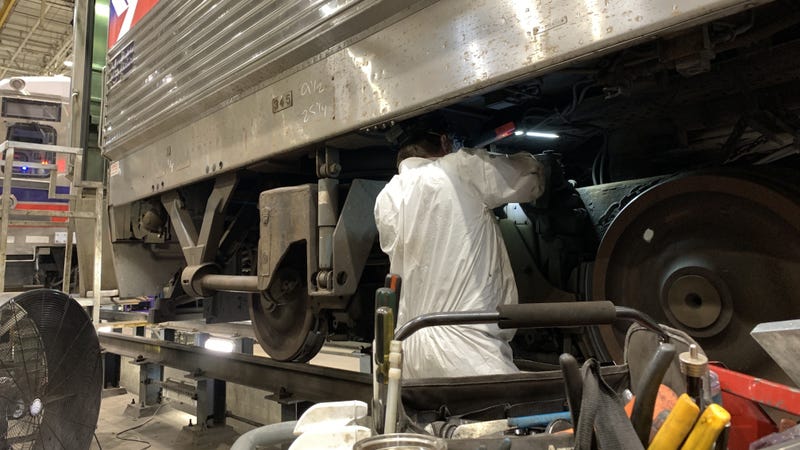
PHILADELPHIA (KYW Newsradio) — As riders endure packed and canceled Regional Rail trains, SEPTA inspectors are working around the clock on federally mandated emergency fire inspections — a process expected to take weeks.
After orders came down from the Federal Railroad Administration a week ago, the transit agency has begun to inspect the propulsion and electrical systems on its Silverliner IV rail cars to try to find the source of five fires earlier this year.
Speaking at SEPTA’s Overbrook maintenance facility on Thursday, Greg Buzby, manager of Regional Rail vehicle engineering, said inspectors have been going over the propulsion, safety and electrical systems on the 50-year-old cars at four different facilities.
“We’re doing it at every location and around the clock at a lot of them. This location is open 24 hours a day, so we’re hoping to ramp up to 12 cars a day,” Buzby said. “Looking for any signs of overheating or damage to any of the circuits, physical damage or something like that.”
SEPTA General Manager Scott Sauer said the early pace has been slow, as mechanical staffers were trained on the process for the federally mandated inspections.
“It’s been a little slow going to get started. We’re probably around 10 or 12 cars through at this point. We expect that process to improve as we go, as people become more efficient in the inspection process,” Sauer said.
Under the federal order, crews are also installing thermal indicators to shut down propulsion if high temperatures are detected. And, according to Sauer, engineers are being urged to report any possible problem, including fault lights in the operator’s cab.
“We have found enough on each incident to know what to look for,” he said, “and the indicator light, and that is a good telltale for us.”
Short- and long-term solutions
Throughout this process, riders have endured crowded and delayed trains at best, and canceled trains at worst.
Sauer said cars are being pulled from service whenever an engineer sees a fault indicator light on board.
“This probably is our new reality, that we’re just going to have to find a way to get these cars through this inspection process more often than we had been,” he said. “Then, we have to find a way to buy new cars.”
That would take up to 10 years and $2 billion, assuming SEPTA had the money. To ease the immediate crunch, SEPTA is scouring the country to buy or lease rail cars from other carriers.
“We’re also going to look for ways to expedite this process,” he said. “Other carriers are buying equipment. Maybe there’s a way we can latch on to their procurement that might shorten the process a little bit.”
Sauer said SEPTA is also improving its app to make more timely notifications when scheduled trains are canceled.
“We’re going to … try and get this fleet as reliable as we can so that customers don’t have to expect 10 years of what they’re seeing this week,” he added.
